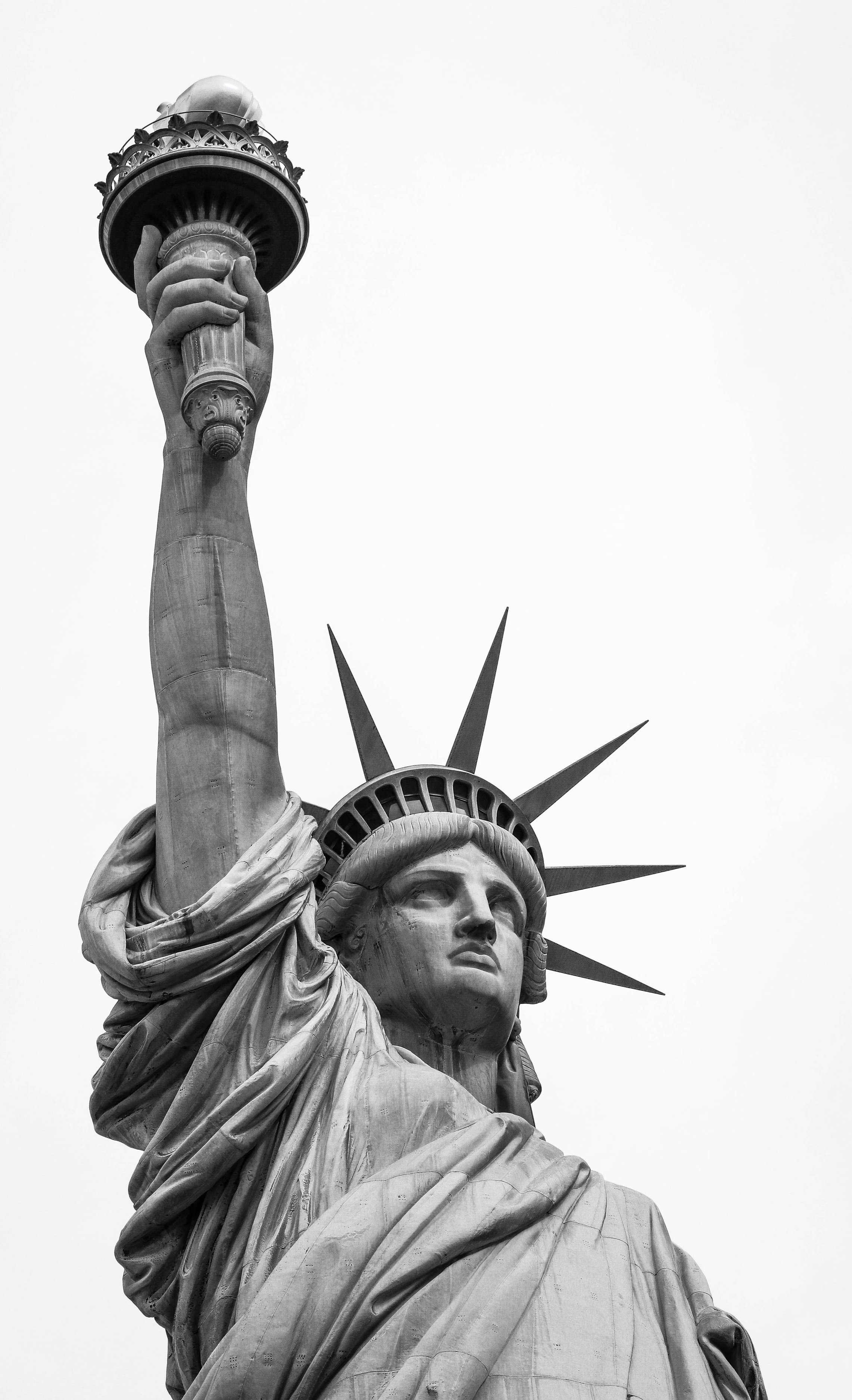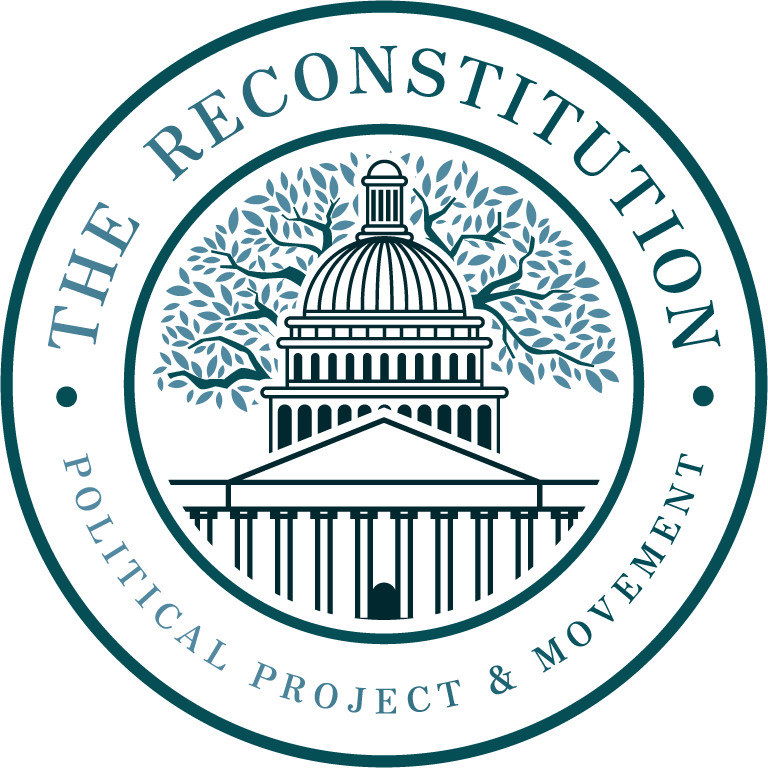
If you want to read The Reconstitution in full, click here.
If not, here are the highlights:
Some things we can all agree on…
-
![]()
Money has too much influence on politics.
We can fix this by:
(i) clarifying the constitutionality of campaign finance reform; and
(ii) limiting campaign contributors to only citizens eligible to vote in a given election.
This would prevent outside individuals and corporations from influencing local elections to manipulate the broader political process.
-
![]()
There aren't enough ways to actively participate in government.
We can fix this by:
(i) forming Citizen Conventions of randomly selected Americans to deliberate on issues; and
(ii) empowering Citizen Conventions to write and co-sponsor legislation.
This would reinvigorate civic engagement and restore faith in our representative form of government.
-
![]()
In the 21st century, many shared interests now transcend geography.
We can fix this by:
(i) introducing an Assembly of Shared of Interests as a third non-geographic chamber of Congress; and
(ii) using demographic factors to determine each American’s representation by one of twenty-seven Assembly members.
This would finally acknowledge the effects of population density and socioeconomic factors on the political landscape, and rejuvenate a more responsive, efficient and effective Congress.
-
![]()
Voters should choose their representatives, not the other way around.
We can fix this by:
(i) mandating that electoral districts are not gerrymandered; and
(ii) minimizing wasted votes and the efficiency gap.
This would ensure that districts are drawn in a way that reflects the actual communities within them, and that their representatives actually reflect the voters being represented.
-
![]()
Political parties are in the way of getting things done.
We can fix this by:
(i) implementing a “single transferable vote” ranked-choice voting system; and
(ii) removing all reference to parties on our ballots and in the parliamentary rules of our legislatures.
This would empower independent candidates to challenge establishment politicians and reduce the stranglehold partisanship has on the legislative process.
-
![]()
Some corporations are too big to hear individual voices.
We can fix this by:
(i) demanding more democratic accountability from large corporations while leaving smaller businesses alone; and
(ii) mandating that 50% of the boards of these corporations be elected by everyday citizens — its workers.
This would use the power of democracy to empower workers within the corporation, rather than leaving workers to rely on unions that often have problems of their own.
-
![]()
The People shouldn't have to clean up after corporations.
We can fix this by:
(i) taxing large corporations for extracting resources from our shared land, or polluting waste into our shared space; and
(ii) ensuring this tax is large enough to make it a good business decision to treat us and our land with the respect we deserve.
This would ensure large corporations actually pay the full cost of what they produce and promote more sustainable outcomes.
-
![]()
Relentless advertisements have become stains on our public spaces.
We can fix this by:
(i) prohibiting the paid-for use of public space for a primary purpose of promotion, publicity, or profit, unless it has cultural value or is in the public interest.
This would restore the sanctity of public spaces and protect the freedom of thought from a violating barrage of targeted influence and intrusion.
-
![]()
Personal privacy is under attack and data collection is out of control.
We can fix this by:
(i) protecting personal data and communication from being collected while in the privacy of your own home or on your own device;
(ii) requiring consent before generating profiles that include fingerprints, facial recognition. or personality traits; and
(iii) making exceptions to protect public safety only when due process is met.
This would ensure we all have the privacy we naturally and rightfully expect in the privacy of our own homes.
-
![]()
Media channels stir up conflict because breaking news generates profits.
We can fix this by:
(i) extending special speech protections to media platforms and press members who act in the public interest;
(ii) providing special immunities against defamation to platforms that are moderated by an independent non-profit entities that provide transparent mass decentralized peer review systems, similarly to Wikipedia.
This would encourage honesty, promote the investigative pursuit of truth, and lower the temperature in our media ecosystems.
-
![]()
Social media algorithms often bring out the worst in people.
We can fix this by:
(i) establishing a public unmoderated social media platform that requires identity authentication and transparency so users are accountable for what they say; and
(ii) empowering government to regulate social media algorithms to ensure they favor the cultivation of mutual respect.
This would give people better social media platforms, bring out the better angels of our nature, and protect our minds from being continuously hijacked.
-
![]()
-
![]()
Wages aren't keeping up with the cost of living.
We can fix this by:
(i) treating people the same way we treat businesses and tax only “personal profits” by raising the standard income tax deduction to meet the local cost of living.
This would ensure that people aren’t taxed into poverty and that all Americans can care for themselves, their families and the American dream.
-
![]()
People don't get paid the value they actually contribute to society.
We can fix this by:
(i) providing a special tax deduction for good samaritans who act as caretakers, volunteers or community service workers.
This would encourage, celebrate, and reward people who positively contribute to society, raise community spirits, and strengthen civic bonds.
-
![]()
A very select few inherit most of the wealth built by previous generations.
We can fix this by:
(i) complementing traditional family wills and estates with homegrown shared inheritance funds distributed equally to all citizens as a minimum income.
(iii) taxing, renting, or licensing shared resources that are removed or borrowed from the commons to fund Universal Shared Inheritance Funds; and
(iv) striving to ensure the minimum income is enough for citizens to secure and improve themselves.
This would ensure that every member of each generation gets to reap some of the benefits of the entire history of human achievement, and that each generation is entrusted with the responsibility of protecting, growing, and paying forward the abundance that they are are bestowed.
-
![]()
Not everyone has the minimum they need to get started on getting ahead.
We can fix this by:
(i) providing the benefits needed to thrive in the society and time they are born into; and
(ii) guaranteeing rights to adequate education, medical care, housing, public utilities, transportation, food, clothing, and social security.
This would restore the American Dream by ensuring everyone has an equal opportunity to enter the economy and participate as a productive member of society.
-
![]()
Safe communities are composed of educated and balanced individuals.
We can fix this by:
(i) prioritizing investment in a strong education system that supports the next generation in realizing their full potential, participating fully in civic life, and contributing productively to the economy and society;
(ii) granting everyone the right to lifelong education and mental health services; and
(iii) making the demonstration of civic responsibility a pillar of immigration process.
This would create safer, stronger, and healthier communities by raising citizens with sound minds, good character, and the ability to live up to their civic responsibilities.
-
![]()
The criminal justice system doesn't minimize crime, nor does it promote justice.
We can fix this by:
(i) choosing restitution, rehabilitation, redemption, and restoration as the preferred forms of justice whenever possible;
(ii) sentencing no further than the minimum level of penalty needed to deter crime;
(iii) diversifying and specializing the system to provide differentiated handling of cases — from public safety officers to court systems and incarceration facilities; and
(iv) outlawing the ownership of detention centers by private, for-profit entities.
This would make our criminal justice system simply do what it is supposed to do — protect public safety, maintain the rule of law, and promote the ideal of justice.
-
![]()
Administrations on both sides of the aisle have made serious military blunders.
We can fix this by:
(i) preferring diplomacy and negotiation over violence and coercion;
(ii) first appealing to civilians through foreign aid rather than manipulating or threatening a population into submission;
(iii) permitting unilateral military action only to address imminent threats; and
(iv) permitting multilateral military action to preempt threats to national, international, or humanitarian security.
This would promote peace at all scales, preserve expectations of national sovereignty, and still permit widely-supported humanitarian intervention.
-
![]()
Global treaties aren't taken seriously because our leaders change often and abruptly.
We can fix this by:
(i) creating a Wisdom Council composed of all living former Presidents who have not been removed from office;
(ii) requiring the President to have consent from a supermajority of the Wisdom Council to withdraw the U.S. from international treaties.
This would provide other nations with reassurance of continuity and consistency across administrations, and provide an important role for the wisdom of leaders who are no longer concerned with popularity, have learned from executive mistakes, and have established valuable international relationships.
-
![]()
Global crises seem hopeless because it's costly and unpopular to be the first to rise to the occasion.
We can fix this by:
(i) giving Congress and the States power to pass legislation that only goes into effect when that legislation is reciprocated by other states or nations; and
(ii) revoking such legislation only with a supermajority of the Wisdom Council.
This would overcome dilemmas of international scale, encourage positive-sum outcomes, and position the U.S. as a leader and first-mover on global issues without needing to sacrifice America first.
-
![]()
Our laws can't seem to keep up with the rapidly changing times.
We can fix this by:
(i) embracing further iteration on the Constitution by entrusting the future with the future; and
(ii) giving Congress the power to amend the Constitution when 2/3 of the chambers in the new tricameral legislature deem it necessary.
This would make it easier, but not too easy, for future generations to amend the Constitution as necessary to adapt to a rapidly changing world.
-
![]()
The Reconstitution of the United States of America
The Interamble (Summarized):
The purpose of this Reconstitution is to renew our commitment to the fundamental principles of the U.S. Constitution, to restore legitimacy and integrity to its government, and to improve democracy so that it may better embody shared American ideals. The goals of the proposed amendments are to improve communication and collaboration among citizens, to protect individual and social flourishing, and to establish new economic and governance systems in alignment with American values and responsibilities.
"I am not an advocate for frequent changes in laws and Constitutions. But laws and institutions must go hand in hand with the progress of the human mind. As that becomes more developed, more enlightened, as new discoveries are made, new truths discovered and manners and opinions change, with the change of circumstances, institutions must advance also to keep pace with the times. We might as well require a man to wear still the coat which fitted him when a boy as civil society to remain ever under the regimen of their barbarous ancestors."
- Thomas Jefferson (July 12, 1816)

